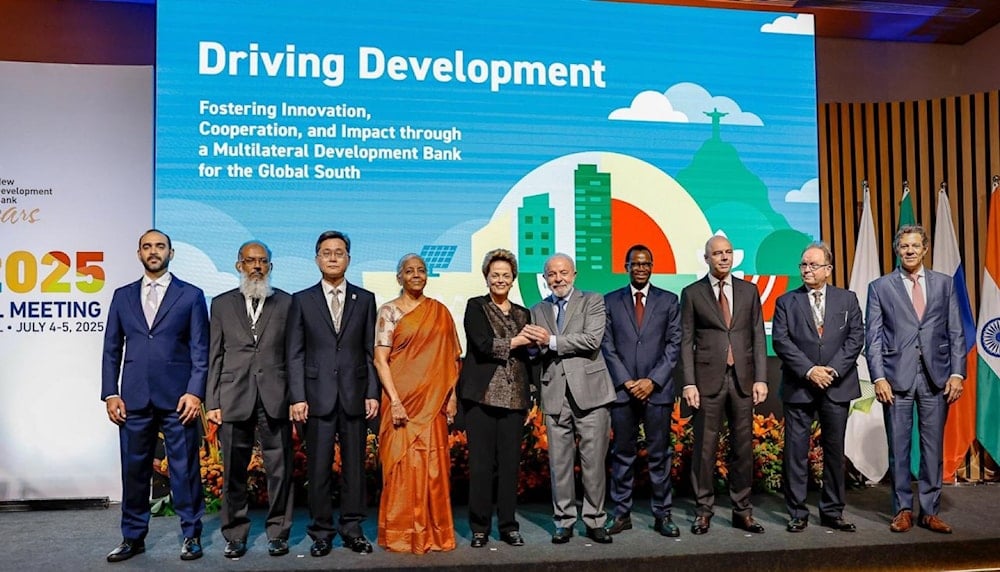South Africa praises BRICS bank shift toward national currency use
South Africa has endorsed BRICS's push to reduce reliance on the US dollar, hailing the NDB's progress in using national currencies to boost economic resilience and regional investment.
-

South African Deputy Finance Minister David Masondo is pictured in Rio de Janeiro for the 10th Annual Meeting of the New Development Bank (X, @DrDavidMasondo)
South Africa has voiced strong support for ongoing efforts within BRICS to reduce dependency on the US dollar, praising the strides made by the New Development Bank (NDB) in promoting the use of national currencies in financial transactions. Speaking on the sidelines of the 10th session of the NDB Board of Governors in Rio de Janeiro, Deputy Finance Minister David Masondo said the transition is strengthening economic resilience among member states.
"South Africa appreciates the progress made by the NDB in various spheres, including its efforts to boost investments in domestic currencies," Masondo stated. "Greater use of national currencies in financial operations helps reduce currency-exchange risks."
The NDB, founded in 2015 to fund infrastructure and sustainable development projects across BRICS and other emerging economies, has expanded its lending and investment portfolio to include currencies such as the Chinese yuan, Hong Kong dollar, and South African rand. Masondo welcomed this diversification, which aligns with broader BRICS efforts to reorient the global financial system away from dollar dominance.
Currency Sovereignty
This pivot is part of a multi-pronged BRICS strategy to enhance financial sovereignty. Initiatives include the BRICS Pay system, designed to facilitate cross-border payments in local currencies without relying on the SWIFT network, and the Contingent Reserve Arrangement (CRA), a $100 billion pool that allows members to access emergency liquidity in national currencies. These mechanisms are aimed at insulating member economies from dollar-induced volatility and sanctions regimes.
Most recently, BRICS announced the creation of a Multilateral Guarantee Fund under the NDB's umbrella to further attract investment into member economies. The fund will allow for guarantees in local currencies, a step Masondo called "critical for unlocking regional infrastructure investment without dependence on Western credit frameworks."
In our anniversary year, we return to Brazil for the 10th #NDBAnnualMeeting, where the founding agreement of NDB was signed during the #BRICSSummit.
, New Development Bank (@NDB_int) July 3, 2025
Watch the curtain-raiser video & join us in Rio de Janeiro, a city known for its beauty and commitment to sustainability!#NDBAM25 pic.twitter.com/Us8Jy1BA3K
Strategic Leverage
For South Africa, these developments offer tangible benefits. The country hosts the NDB's Africa Regional Center in Johannesburg, giving it strategic leverage in mobilizing BRICS resources for the continent. Access to NDB loans denominated in rand, as opposed to dollars, has also enabled Pretoria to manage infrastructure financing with reduced exposure to exchange rate shocks.
As the 17th BRICS summit opens in Rio de Janeiro (July 6–7), currency cooperation will remain high on the agenda. While the idea of a unified BRICS currency remains under discussion, the bloc is focusing on expanding the use of existing national currencies in trade and investment. Russian President Vladimir Putin is expected to participate virtually, while Foreign Minister Sergey Lavrov will attend in person.
Read more: BRICS expansion draws Southeast Asia closer to bloc's orbit: FP
BRICS leaders are increasingly framing this shift not only as an economic adjustment but as a political rebalancing, one that seeks to empower emerging economies and resist the dominance of dollar-centric institutions.

 3 Min Read
3 Min Read








